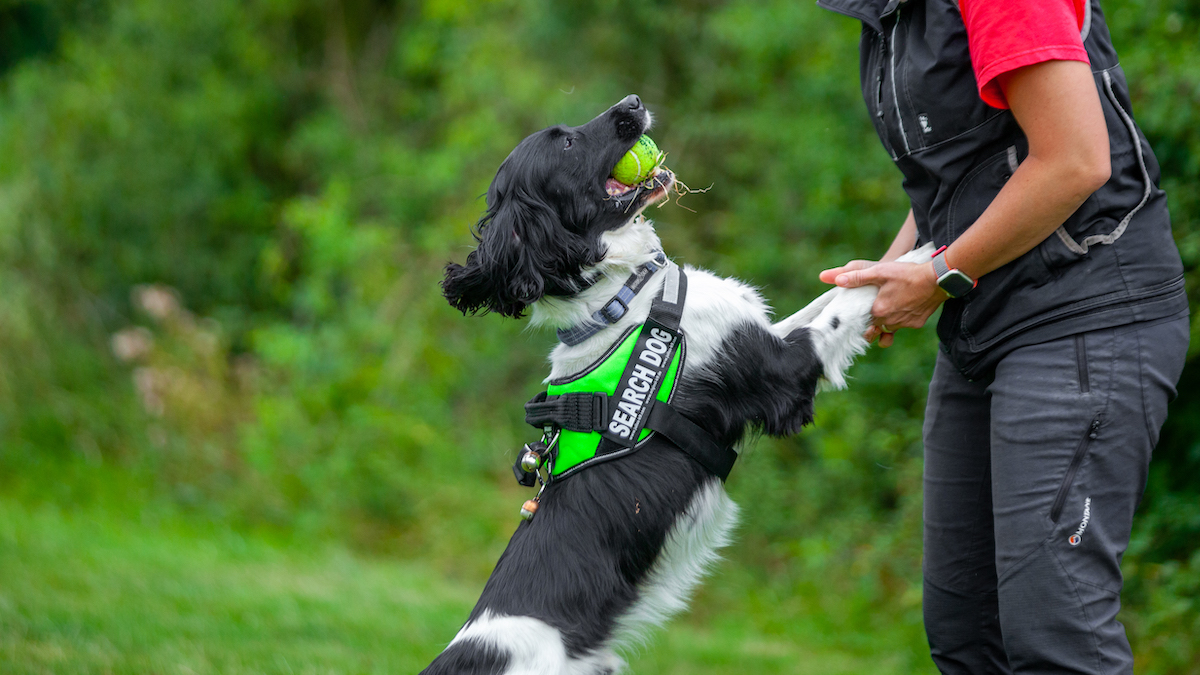A Step-by-Step Approach to Dog Training Success
A Step-by-Step Approach to Dog Training Success
Blog Article
The Ultimate Guide to Canine Training: Transform Your Animal's Habits
Effective pet training is important for promoting an unified connection between pets and their proprietors. The ins and outs of canine behavior and the application of structured training techniques play an essential function in this process. By comprehending the concepts of favorable reinforcement, uniformity, and socialization, pet owners can browse common difficulties that occur during training. This guide not just aims to furnish you with the required devices to change your pet dog's habits but likewise invites you to discover how these fundamental ideas can cause a deeper link with your pet. What might be the initial action in this transformative trip?
Comprehending Pet Dog Actions
Recognizing pet dog behavior is important for effective training and a harmonious partnership between canines and their owners. A canine's actions is influenced by a combination of genetics, environment, and experiences. Dog training. Identifying these variables allows proprietors to tailor their training approaches to satisfy the individual needs of their animals
Pets communicate largely via body movement, vocalizations, and faces. A wagging tail can suggest enjoyment or happiness, while a put tail might indicate worry or entry. Observing these hints enables owners to respond properly, reinforcing positive actions and dealing with negative ones properly.
In addition, understanding the social structure of pet dogs can supply understandings into their habits. Dogs are pack animals, and they grow in an organized atmosphere. Developing consistent regulations and clear borders can prevent confusion and promote a complacency.
Furthermore, identifying the all-natural impulses of canines, such as the urge to dig or chase, is essential. These impulses can be rerouted via appropriate electrical outlets, such as play or exercise. By adequately comprehending these behavioral facets, owners can foster a positive training experience, eventually resulting in a obedient and well-adjusted canine friend.
Important Training Strategies
Effective pet training counts on a variety of necessary techniques that can significantly enhance the learning process for both the dog and the owner. One fundamental method declares support, which involves rewarding desirable behaviors with deals with, appreciation, or playtime. This approach motivates canines to duplicate the behaviors that lead to positive results, cultivating a relying on partnership in between the pet and proprietor.
An additional secret strategy is consistency in commands and expectations. Utilizing the very same spoken hints and hand signals assists the canine understand what is required, minimizing confusion and advertising quicker learning. Furthermore, establishing clear borders and regulations is vital for efficient communication.
Socializing is also a crucial element of training. Exposing pet dogs to various settings, individuals, and other animals assists them create ideal social skills and decreases stress and anxiety in unknown scenarios.
Finally, patience and timing are essential. Educating sessions ought to be brief yet frequent, ensuring that the pet stays involved and receptive. By employing these essential strategies, owners can develop a positive and organized training experience that promotes etiquette and reinforces the bond with their canine companions.
Creating an Educating Schedule
Just how can a well-structured training schedule boost a dog's discovering experience? A training schedule supplies uniformity, making sure that pets get normal, focused direction. This predictability aids pet dogs understand what is anticipated of them, enhancing their understanding and enabling much better retention of site commands and actions.
When creating a training routine, it is vital to take into consideration the dog's age, breed, and private personality. Young puppies might profit from shorter, much more regular sessions, while grown-up pets may love longer, less frequent training periods. Integrating a selection of tasks can also keep the sessions engaging, stopping dullness and advertising enthusiasm for knowing.
Furthermore, organizing training sessions at certain times of the day can aid strengthen a regimen. For example, pairing training with daily walks or playtime can produce a positive association with knowing. It is also essential to include time for reinforcement, such as treats or appreciation, to compensate wanted actions immediately.
Last but not least, versatility is crucial. While consistency is important, being adaptable to the dog's state of mind or power degree can improve their knowing experience. A well-crafted training schedule ultimately lays the foundation for reliable interaction and a stronger bond between the dog and proprietor.
Typical Training Challenges
Regardless of having a well-structured training timetable, pet dog owners often encounter different obstacles during the training procedure. One common Discover More Here concern is inconsistency in cues and commands. When several member of the family use various terms or tones, a pet dog might come to be confused, hindering its capability to find out properly.
An additional regular challenge is disturbance. Dog training. Dogs are normally curious animals, and external stimulations such as other pets, noises, or individuals can divert their attention throughout training sessions. This requires proprietors to create a regulated environment or slowly introduce disturbances to reinforce emphasis
Additionally, differing power levels can influence training outcomes. High-energy pets may have a hard time to settle and focus, while more laid-back types might need added motivation to involve. Customizing the training method to fit the specific dog's character is essential for success.

Building a Strong Bond
A solid bond in between a canine and its proprietor is essential for effective training and general health. Dog training. This partnership cultivates trust fund, which is crucial for effective communication during the training process. When a dog feels protected and connected to its proprietor, it is more probable to react favorably to hints and commands
To develop this bond, uniformity is vital. Developing a regimen that includes regular feeding, exercise, and training sessions aids develop a feeling of stability. Additionally, positive support strategies, such as deals with, praise, and play, reinforce desired actions while reinforcing the psychological connection.
Socialization is an additional crucial element of bond-building. Exposing your dog to various atmospheres, people, and various other pets assists them feel extra confident and comfy, improving the bond with this content their owner. Taking part in activities with each other, such as strolling, playing fetch, or joining obedience training, advertises teamwork and common pleasure.
Conclusion

Recognizing pet habits is important for effective training and an unified relationship between pets and their owners.Effective pet dog training counts on a variety of vital strategies that can significantly enhance the discovering procedure for both the proprietor and the pet.Regardless of having a well-structured training timetable, canine proprietors frequently come across numerous obstacles during the training process.In conclusion, effective canine training depends on a thorough understanding of canine actions, the application of essential techniques, and the establishment of a structured training schedule. By emphasizing positive reinforcement and consistency, dog owners can significantly enhance their pets' behavior, ultimately guaranteeing a harmonious relationship and promoting the well-being of both the pet and its setting.
Report this page